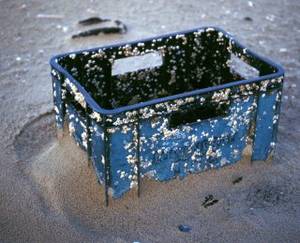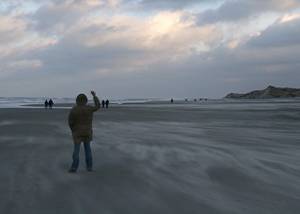Materiality (and Climate Change)


In this project, materiality is not grasped as something static. To the contrary: the material, the bodily, the corporeal evokes and induces particular dynamics. These dynamics are destructive and erosive but at the same time also constructive and evolving. This kind of material change is everywhere. Things deteriorate, if they are not maintained. Time produces clutter. Some things start to grow. Some of this happens at strange places and unforeseen moments, but also in the bright daylight and under the eyes of us all. Some of this happens very slowly, but change can also come with unanticipated and overwhelming speed.
In this regard, climate change is of particular – and probably vital – interest. On the one hand, it is practically indiscernable and can only be measured using a huge array of technological infrastructure. On the other hand, it affects or could affect an almost inconceivable amount of different aspects that are relevant in our daily lives – thus posing a significant threat.
Do people relate their everyday experiences to climate change? Who does this? How do these changes enter perception? As I stated earlier: perception and action belong together. The materiality and the immateriality of climate change is both experienced and made in our everyday lives.
Subject Matter


To come to terms with these issues, islands offered themselves as fitting objects for my study. Among other things, they distinguish themselves by being relativ acutely threatened by rising sea levels – one of the primary effects of climate change. The threat of the sea, called Blanker Hans at the German North Sea coast, has always been present to those living in coastal areas. Storm floods can destroy houses and wreck harvests, they can kill friends and family.
However, climate change might change the ways in which these floods and the sea itself are perceived. It can bring a new quality into the relations between “mankind” and “nature” – a quality that display the intimate linkages between both. To me, it also seems to be highly likely, that technology, as a prominent thing-in-between nature and mankind will play a marked role regard the ways climate change is experienced, generated, perceived.


The East-Frisian islands at the German North-Sea coast are locations where the relations between the forces of nature, technology, everyday life, architecture, work, and tourism have to be constantly negotiated by everyone – and everything – involved. The marked boundaries of these islands along with their limited size make it possible to study the different topological layers and topographic features in adequate detail. It should be possible to trace, map, or deconstruct the patterns of appropriation and disappropriation on one of these islands.
Materiality is a central aspect of the spatialized practices that form life on the island: sand and doormats, wind and doors and windows, walks at the beach and visit to the tea room cottage, physical closeness and flirts in the discotheque along with openness and emptiness at the out-of-season beach, wellness and fatigue, migrant workers and tourists and islanders and migratory birds, cars on the main land and horse carriages on the island, storm floods and coastal protection works, garbage ships and national park, mobile phones and tide-dependant ferries – the list can go on and on.
At these interfaces, or foldings of topology and topography, of nature and technology I want to explore the relations between material and social dynamics. I want to examine the conflicts that arise in this peculiar setting and I want to do all of this with a focus on everyday life, on the perceptions and actions of people on these islands.
Method
Since the object of this study is multi-faceted, the methods employed to study it have to be multi-faceted, too. I will work with a wide spectrum of different, qualitative methods: participant observation, interviews, auto-ethnography, logging and analysis of images, sounds, and video, and artefact analysis. All of this will be examined with a particular focus on that which might seem obvious and on that which is subtle (often, this is the same). Ethnomethodology is a distinct leading light for the analysis: I want to focus on the interpretations offered and displayed by the actants themselves – without forgetting about context, of course. My main rule of observation ist to study that which is relevant or made relevant locally and in everyday practice.
Theory


Social theories will not implemented as sets of rules for interpretation in this study. Instead, I want to make a host of different theories clash with my observations and involvement in the field. Thus, it should be possible to enrich both theoretical discourse and empirical findings. To grasp the wide field of issues in an adequate way I will seek to confront many different conceptualizations and authors with each other and the raw matter of experience and perception: Ulrich Beck, Arnold Berleant, Luc Boltanski, Pierre Bourdieu, Manuel Castells, Michel de Certeau, Alain Ehrenberg, Tim Edensor, Michel Foucault, Harold Garfinkel, Erving Goffman, Bruno Latour, Henri Lefebvre, Lyn Lofland, Karl Marx, Maurice Merleau-Ponty, Andrew Pickering, Richard Sennett und Sharon Zukin – between them I will try to negotiate the waters of high theory, looking for explanations and inspirations, trying to stay clear of meta-theoretical fogs and epistemological reefs.
Further Reading on Materiality (in German)
A programatic statement for research on the relations between social change, perception and materiality: Materialität und soziale Ordnung – Inselgesellschaften im Klimawandel. (2008)
Another programatic statement on integrating the concepts/terms materiality, things, praxis, and performativity. Written while working on my PhD: Zum begrifflichen Instrumentarium – Dinge und Materialität, Praxis und Performativität. (2004)
Some information regarding the background of this project and my personal motivations for doing it: Gezeiten und Ströme, Erholung und Erosion – Motivationen. (2007)
And, finally, my book: Einhüllende Materialitäten. Eine Phänomenologie des Wahrnehmens und Handelns an Bahnhöfen und Fährterminals.
Contact us
Research Training Group
"Topology of Technology"
Technische Universität Darmstadt
Postal Address
Dolivostr. 15
64289 Darmstadt
Germany
Speaker
Prof. Dr. Petra Gehring
Department of Philosophy
gehring(at)phil.tu-darmstadt.de
Phone: +49 (0)6151 16-57333
Speaker
Prof. Dr. Mikael HĂĄrd
Department of History
hard(at)ifs.tu-darmstadt.de
Phone: +49 (0)6151 16-57316
Visitors Address Coordination
Landwehrstr. 54
S4|24 117
topologie(at)ifs.tu-darmstadt.de
Phone: +49 (0)6151 16-57365
Anne Batsche
Tue–Fri 10.00–15.00
topologie(at)ifs.tu-darmstadt.de
Marcel Endres
Mon–Wed 8.30–15.30
endres(at)gugw.tu-darmstadt.de
Visitors Address Fellows
Landwehrstr. 54
S4|24 106–112
Phone: +49 (0)6151 16-57444


 Drucken
Drucken
